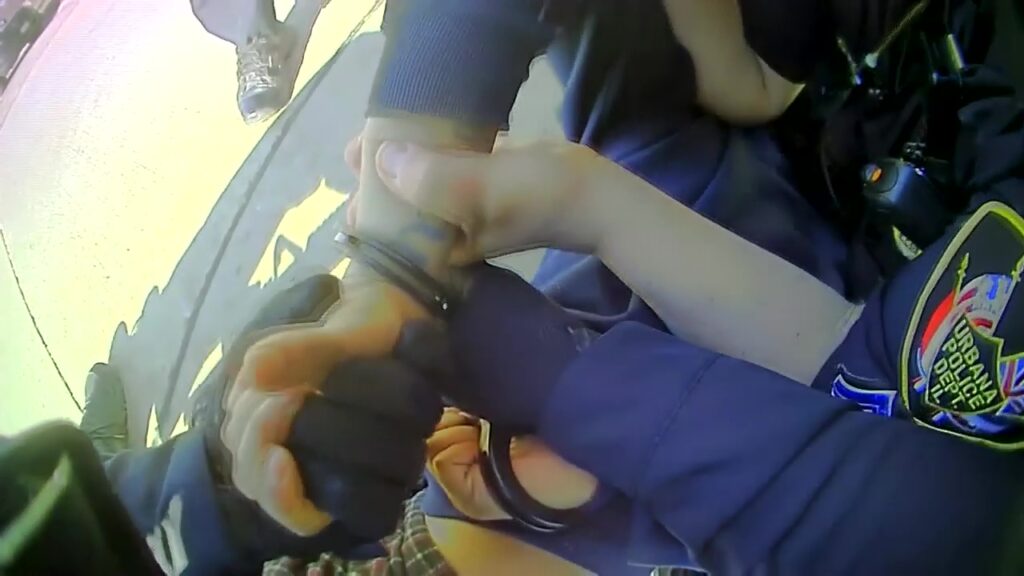Bijal Patel, Christopher Hansen, Sarah Nixon, Alen Romero (originally published by the Public i)

Background: Growing Outcry Around the Arrest of Aleyah Lewis
On June 22nd, amid a flood of protests from Urbana residents, Mayor Diane Marlin announced that the city would be hiring Hillard Heintze, a ‘strategic security and corporate investigations consulting firm’, to perform a third-party review of the Urbana Police Department’s violent April 10th arrest of Urbana resident Aleyah Lewis. Taxpayers will foot the bill of $16,575 (with expenses and additional services at $195/hr) charged by the firm to review the incident where Lewis, a victim of domestic violence, and possible witness to an accidental discharge of a firearm, was tackled and beaten by Urbana Police officers. Following the arrest, Champaign County State’s Attorney Julia Reitz filed charges against Lewis that include aggravated battery to a peace officer and resisting a peace officer. If convicted, Lewis will face a maximum sentence of over a decade in prison. Numerous witness and body camera videos of the arrest are circulating online, and concerned residents have been packing public input at Urbana City Council meetings and mounting ongoing protests, with many calling for all charges stemming from Lewis’ arrest to be dropped, and some calling for the resignation of the police chief and the mayor. A clear and widening rift has been established. On one side are residents and community groups advocating for police reform, who find the charges wrongful and actions taken by officers to be escalatory, racist, and unjustified. On the other side is local leadership, including Mayor Diane Marlin and Police Chief Bryant Seraphin, who have deemed the officers’ actions justified, and State’s Attorney Julia Reitz, who is prosecuting Lewis.
Similar tensions between residents and local authorities are playing out across the country amidst a national re-examination of the toxic culture of policing in America. In response, many cities have commissioned third-party reviews that purport to provide independent investigations into specific incidents, and recommendations for improving policing practices. At first glance, this approach seems a welcome change from city leadership’s initial strategy, which consisted of alternating between stonewalling, releasing astoundingly biased press releases, and putting on an absurdly unfair mock trial led by Chief Seraphin. However, the background of the firm chosen, the opaque selection process, and dispiriting reports from the few community members who have been asked to participate in the review, suggest that engaging Hillard Heintze may serve more as a public relations move by city leadership than a substantive step towards accountability.
A firm with a national reach, deep ties to policing, and a poor history of community engagement
Over the past few years, Hillard Heintze has been commissioned to review use-of-force incidents and policies across the nation, including in Denver, CO, Louisville, KY, Oakland, CA, and Elgin, IL. The firm has deep ties to the Chicago Police Department; its founder, Terry Hillard, served as Chicago police superintendent from 1997-2003, and many of its staff are former CPD personnel. Hillard’s association with the firm has drawn scrutiny as to its ability to objectively manage cases of police misconduct, with allegations made that during his time as police chief, Hillard’s administration failed to aggressively investigate misconduct related to Chicago’s infamous police torture scandal, one of the worst examples of police brutality in American history.
Hillard Heintze has assigned a five-person team to the Lewis investigation, composed solely of former law enforcement personnel, and headed by Debra Kirby, who has herself faced accusations of failing to support police whistleblowers and failing to aggressively deal with police misconduct during her term as deputy superintendent at the Chicago PD. The other members of the review team are Marcia K. Thompson, a former law enforcement administrator, Mark Giuffre, a former Drug Enforcement Agency special agent, Shirley R. Colvin, a former Chicago Police investigator, and Rob Davis, former chief of police of San Jose, who retired in 2010 amidst heavy criticism for rampant racial profiling under his leadership. From any objective standpoint, the makeup of this team gives cause for concern. While knowledge of law enforcement is obviously relevant experience, a group consisting solely of former police department employees can hardly be expected to provide a balanced perspective in an investigation of departmental policy violations, an issue that played a key role in the city of Madison’s decision not to contract with Hillard Heintze for its own police review. When reached for comment for this article, Hillard Heintze confirmed the team, but otherwise issued no comment.
While Hillard Heintze receives accolades from mayors and police chiefs across the country, reviews from communities suffering under police violence have been mixed. Notably, in several high-profile cases, the firm has made welcome recommendations for sweeping reform in policing practices, but has attracted the criticism that its findings are often limited to broad policy issues and nonspecific recommendations, and that it employs an ineffective approach towards community engagement. After the firm completed its review of the 2019 mass shooting in Virginia Beach, at a taxpayer cost of $500,000, victims’ representatives described their 262-page report as, “just a fluff piece for the city,” and a “partial report”. Pushing for further investigation by the state, victims denounced the document as only “a summarized report of what the [city] gave us” and “neither thoroughly or sufficiently independent to be effective.” Finally, some of Hillard Heintze’s most damning criticism comes from its own backyard. Tracy Siska, director of the Chicago Justice Project, has written, “I cannot imagine why anyone would pay [Hillard Heintze] to consult on such issues, unless of course you are trying to find experts in burying complaints and ignoring communities.”
An opaque selection process and discouraging lack of public engagement
With the ever-growing controversy and persistent public scrutiny that the handling of the Urbana Police Department’s arrest of Lewis has attracted, the importance of prioritizing caution and transparency in selecting a firm to conduct a third-party investigation cannot be overstated. The chosen reviewer would need to be seen as neutral, and capable of releasing findings and recommendations that can carry weight with both the community and the administration. Unfortunately, in line with the city’s heavy-handed approach so far, it appears no such considerations were made. The selection of Hillard Heintze was determined entirely by (unelected) city staff and Mayor Marlin, and the Urbana City Council was not given an opportunity to vote on the contract, a fact underscored by several council members to whom we reached out.
After such an inauspicious start, perhaps it is not surprising that reports from residents who participated in Hillard Heintze’s invite-only ‘learning sessions’ have been discouraging. elizaBeth Simpson, of grassroots organization CU Showing Up for Racial Justice (CU-SURJ), participated in a July 28th session, and described the event as “poorly planned”. She noted that after an hour-long presentation from the firm, just twenty minutes were allotted for participants to work in small groups to self-administer a questionnaire, and then discuss seven critical open-ended questions, including how to “help the community feel officers are being held accountable when force is used”. Simpson stated that “no [Hillard Heintze] note takers were placed in the groups,” leaving it to participants to compile records of discussions “haphazardly, if at all,” before submitting to Hillard Heintze staff at the end of the session. Summing up the experience, she wrote, “as a professional facilitator of 20 years, and as a researcher for the last 7 years, I can say with confidence that the aspect of data gathering was a really poor set up. I can’t believe this is a national firm that is currently conducting police review work in over 10 cities.”
Urbana City Council member Jared Miller has also expressed concern. In a recent email exchange, he wrote that at the community engagement session in which he participated, the Hillard Heintze representatives seemed unengaged, attendees were given little information as to what they were being asked to do and why, the feedback part of the session was rushed, and the facilitator (Thompson) stated that there would be no discussion of the arrest of Aleyah Lewis, because “someone else was working on that review.” Miller also noted that one of the five community member participants had no comprehensive knowledge of the arrest, no familiarity with the Urbana Police Department, and was, in fact, not even an Urbana resident. He concluded, “There is a zero percent chance that anything meaningful could be derived from those 4.5 hours of input sessions”, and that he is “not holding [his] breath … for anything meaningful to come out of the review.” He is, however, “eagerly waiting to be surprised and look[s] forward to eating [his] words should things turn out differently.”
Conclusion: A long road to police reform in Urbana
The struggle for police reform in Urbana is a microcosm of the larger ongoing fight for racial justice in America. In the face of clear and persistent evidence of wrongdoing, the entrenched political, law enforcement, and legal establishment here, as everywhere, are paying lip service to the cause of equitable policing, while forcefully opposing community-led approaches to reform. Meanwhile, a young Black resident of Urbana, a community member who was not even suspected of having committed a crime, faces over a decade behind bars for having crossed paths with our police department, and falling victim to their assault.
On August 24, Hillard Heintze will present their report to the city council. For the past four months, Urbana’s outspoken residents have been calling for a truly independent and rigorous outside investigation into this failure by their police department. It remains to be seen whether or not this is what they will get.
The authors of this piece are thankful to the many community groups working to end police misconduct in Urbana, Champaign, and beyond. Members of Champaign-Urbana Showing Up For Racial Justice, and Defund and Disband CU Police have contributed to the writing and research of this article.

In my view of the police body camera footage, the police officers involved are solely culpable to the escalation and arrest. So determined to find otherwise are the officials involved in the investigation that none take ownership in finding anything amiss, not even as much as the gun safety position, a completely non-subjective measure.
Moreover, its gonna take more than the two hours of the classroom training allocated to address implicit bias among certain CUPD officers. Setting aside customary discriminates, the physical size difference between the police officers and alleged suspects in the police body camera footage are cause for great concern.
Aimed at skill-building in de-escalation techniques, I’ll suggest a light lunch be provided during a full day CUPD and Champaign County Sherriff’s department event for unconscious bias training. The trainer can segue to lunch break by incorporating remedial gun safety training at that time.
Annual refresher training can reinforce key concepts delivered during the full day event.